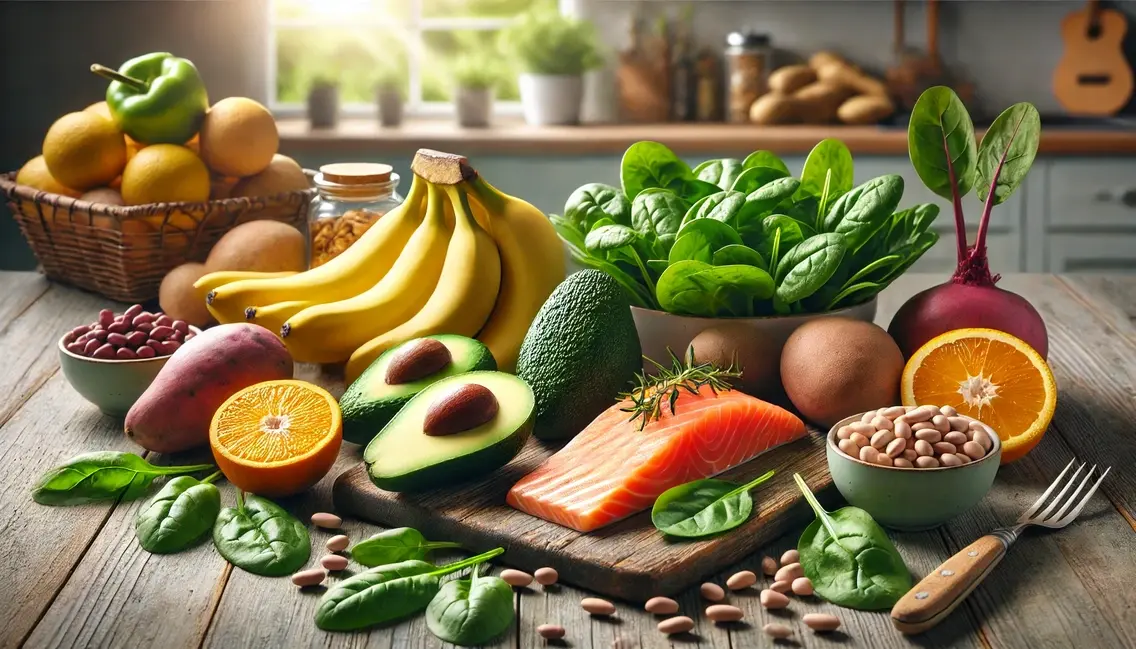The Secret to Unleashing Vital Health: The Potassium You Need
Imagine unlocking the secret to boundless energy, improved heart health, and muscular strength all with one essential mineral—Potassium! It’s a silent hero in our diets, often overshadowed, yet crucial for sustaining life. Have you ever wondered why muscle cramps, fatigue, or an unexplainable weakness suddenly strike? It might be more than everyday exhaustion; it could be a sign of low potassium, or hypokalemia, which can lead to severe health complications if left unchecked, according to the Mayo Clinic.
Potassium is not just about balancing electrolytes. It plays a pivotal role in regulating heart rhythms and ensuring our muscles perform at their peak. Despite its significance, many of us fall short of the recommended daily intake—2,500 to 3,000 mg for adults. But here’s an overlooked truth: the lack of this mineral can silently undermine your health.
So, what’s the real solution? Should you rely on supplements, or can nature’s own powerhouses—like bananas, potatoes, and avocados—suffice? Before making changes, understanding potassium’s impact on your body is key. In this enlightening piece, we’ll explore how to seamlessly boost your potassium levels and why monitoring them is critical, especially if you deal with certain medical conditions or medications. Whether you're an athlete aiming for peak performance or someone keen on maintaining their health, knowing when and how to supplement could transform your life.
Let’s delve deeper into understanding this vital mineral and uncover its transformative potential for your well-being!
Health Benefits of Potassium
Potassium is a vital mineral with crucial roles in maintaining our body's physiological balance. Renowned for supporting cardiovascular health, muscle functionality, and nerve signaling, ensuring sufficient potassium levels is essential for maintaining overall well-being.
Key Health Benefits
- Supports Cardiovascular Health
Potassium is instrumental in heart health and blood pressure management by helping regulate sodium levels in the body. Adequate potassium intake is linked to a lower risk of hypertension and stroke, as it assists in relaxing blood vessel walls and improving circulation efficiency.
- Promotes Muscle Function
As a key electrolyte, potassium is vital for muscle contraction and helps prevent muscle weakness and cramping. Sufficient potassium levels are necessary for the smooth operation of muscles, essential for both everyday movements and optimal exercise performance.
- Aids in Nerve Function
Potassium ions play a crucial role in nerve function, enabling the transmission of electrical signals between cells. This capability is essential for muscle contractions, regulating heartbeats, and ensuring effective communication across the nervous system.
- Balances Fluid Levels
Potassium is central to maintaining fluid and electrolyte equilibrium in cells and tissues. This balance is fundamental to cellular function and metabolic activities and helps counteract the effects of excessive sodium on fluid retention.
Incorporating Potassium for Optimal Health
Ensuring sufficient potassium levels supports vital biological functions necessary for overall health. Consider incorporating potassium-rich foods, such as bananas, sweet potatoes, and spinach, into your diet. To get maximum strength support for hydration and heart health, many trust Jamieson's Timed Release Potassium 195 mg for reliable supplementation.
Dietary Sources of Potassium
Potassium is an essential mineral that plays a crucial role in maintaining muscle function, nerve signaling, and fluid balance. It's vital to ensure adequate intake from natural food sources to support these bodily functions and prevent complications from potassium imbalance.
Natural Sources of Potassium
- Bananas
Known for their high potassium content, medium-sized bananas offer approximately 422 mg of potassium. They are easy to consume and help support normal muscle and nerve functions.
- Potatoes
A medium potato, with skin, provides about 926 mg of potassium. Besides this mineral, potatoes also offer fiber and vitamin C, making them a nutritious dietary choice.
- Spinach
Spinach is a powerhouse of potassium, delivering 839 mg per cooked cup. Additionally, it supplies other beneficial nutrients such as iron and vitamins A and C.
- Avocados
Avocados are rich in potassium, with around 975 mg per fruit. They also provide healthy fats and fiber, contributing to overall health and wellness.
Challenges of Obtaining Enough Potassium from Diet
While these foods are excellent sources of potassium, many Canadians find it challenging to consistently consume enough to meet daily recommendations through diet alone. Factors such as dietary preferences, convenience, and availability of fresh produce can hinder achieving optimal potassium intake. This gap can have consequences on hydration and heart health, especially for those with increased needs due to lifestyle or health conditions.
For those facing challenges in obtaining sufficient potassium from food alone, considering a supplement like Jamieson's Timed Release Potassium 195 mg can offer maximum strength support for hydration and heart health, effectively complementing dietary efforts. This product ensures steady nutrient release throughout the day, optimizing your body's potassium levels without relying solely on food sources.
To support your potassium intake, incorporate a variety of these rich sources into your meals. Whether through a spinach salad, a baked potato, or avocado toast, including these foods can promote your overall health.
Daily Intake for Potassium
Potassium is a vital mineral playing a significant role in maintaining normal cell function, nerve transmission, and muscle contraction. It is instrumental in regulating fluid balance, nerve signals, and muscle contractions. Moreover, potassium is imperative for heart health, as sufficient levels can assist in lowering blood pressure, reducing the risk of stroke, and preventing kidney stone formation.
Recommended Daily Intake
Understanding your body's potassium needs is crucial for optimal health. Here's a breakdown of the recommended potassium intake by age and condition based on scientific guidelines:
- 1-3 years: 2,000 mg per day
- 4-8 years: 2,300 mg per day
- 9-13 years: 2,500 mg per day
- 14-18 years (males): 3,000 mg per day
- 14-18 years (females): 2,300 mg per day
- Adults (males and females): 2,500 to 3,000 mg per day
- Pregnant women: 2,900 to 3,000 mg per day
- Breastfeeding women: 2,900 to 3,000 mg per day
Meeting Your Daily Potassium Needs
To ensure your body functions optimally, achieving consistent potassium intake is essential. Eating a variety of potassium-rich foods such as bananas, potatoes, spinach, and avocados is crucial for meeting your daily requirements. Sufficient potassium intake can help prevent complications like muscle weakness, fatigue, and irregular heart rhythms often associated with hypokalemia. For those needing a little extra support to meet their potassium needs, consider Jamieson's Timed Release Potassium 195 mg for maximum strength in hydration and heart health support.
Consistency is key in maintaining adequate potassium levels, helping your heart, muscles, and nerves stay healthy. Let's delve next into recognizing symptoms of potassium deficiency and understanding precautions to maintain a balanced diet.
Deficiency of Potassium
An essential mineral, potassium is vital for maintaining a range of bodily functions. A deficiency, known scientifically as hypokalemia, can negatively impact muscle efficiency, cardiovascular health, and overall wellness. Understanding these risks not only underscores its importance but also highlights why you should be vigilant about your intake.
Deficiency Symptoms and Consequences
- Muscle Weakness and Cramping
Potassium plays a crucial role in muscle contraction and nerve function. A deficiency can disrupt these processes, manifesting as muscle weakness, cramps, and spasms. According to the Mayo Clinic, these issues arise due to impaired neuromuscular activity.
- Irregular Heart Rhythms
Maintaining normal heart rhythms is another critical function of potassium. A deficiency may lead to arrhythmias, which can elevate the risk of heart palpitations and, in extreme cases, cardiac arrest, highlighting the vital cardiovascular role of this mineral.
- Fatigue and Overall Weakness
By supporting cellular energy production, potassium ensures vitality and mental alertness. Low levels can result in marked fatigue and general weakness, hindering daily functioning and diminishing life quality.
Preventing Potassium Deficiency
The best strategy to avert potassium deficiency is ensuring a diet rich in potassium-laden foods such as bananas, potatoes, spinach, and avocados. Monitoring your potassium intake is imperative, and supplementing it should be done under medical guidance. For those concerned about maintaining optimal potassium levels, obtaining maximum strength support for hydration and heart health with Jamieson's Timed Release Potassium 195 mg can be a reliable option.
Curious about what misconceptions exist and how potassium deficiency might uniquely affect you? Keep reading as we delve into some frequently asked questions and shed light on practical concerns about potassium’s impact on health.
Conclusion
As you navigate your fitness journey, it's crucial to recognize that small changes in your diet can lead to significant health improvements. Potassium, often overlooked, is a cornerstone in promoting not only muscular strength and heart health but also ensuring that your body operates at peak efficiency. Think of potassium as the unsung hero of your health arsenal, quietly working behind the scenes to maintain the balance and energy you need.
Now equipped with a deeper understanding of this vital mineral, the power is in your hands—or rather, on your plate! Will you choose to enhance your potassium intake naturally through delicious foods like bananas and avocados, or perhaps consider supplementation to meet your needs? Each decision counts and adds up over time, shaping your overall well-being.
Before you move on, take a moment to reflect on your current routine. Are there gaps that need to be filled to ensure you're getting the recommended potassium levels? Which of these insights will you apply to your own health regimen starting today?
Engage with those around you; share your newfound knowledge with friends or workout partners and see how their perspectives might broaden your own. And hey, why not drop into the comments section below to share your thoughts—what's your favorite source of potassium, and why?
Remember, wellness is a collective journey, and supporting each other can make it even more rewarding. Whether it's starting with a bowl of potassium-packed spinach or reaching out to a friend to discuss dietary strategies, know that every step you take moves you closer to enhanced vitality. After all, your health is your biggest asset, so nourish it with the respect and attention it deserves.

